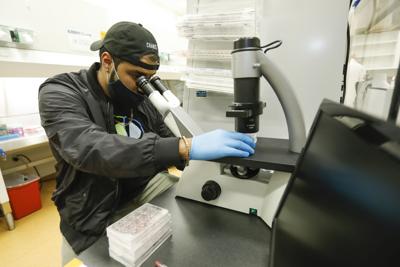The ongoing effort to make Wisconsin a nationally recognized technology hub could get a $7.5 million boost from state funds following the passage of a bill designed to help Wisconsin compete for up to $70 million in federal funds.
The Biden administration selected Wisconsin from a pool of a few hundred last October, awarding it designation as one of 31 regional “tech hubs.” Submitted by a consortium of biohealth businesses, colleges and economic development agencies, Wisconsin’s successful application focused on the Madison and Milwaukee-Waukesha regions as hotbeds of innovation in personalized medicine, the growing field of tailoring medical treatments to a patient’s genes.
The selected hubs are now eligible to apply for a second phase of the process, in which three to eight regional hubs will receive between $40 million and $70 million each to implement their plans, funded through the CHIPS and Science Act of 2022.
But before they can submit their applications to the U.S. Economic Development Administration (EDA), the hubs must show that they can match 10% of the federal funds with other investments.
Now, a bill that would authorize those funds is headed to Gov. Tony Evers’ desk with near-unanimous support from legislators.
Introduced by Sen. Duey Stroebel of Saukville and Rep. Amanda Nedweski of Pleasant Prairie, both Republicans, the bill would commit $7.5 million to be awarded if Wisconsin wins a Phase 2 grant. On Feb. 13, it passed the Senate 15 to 1, with DePere Republican André Jacque casting the lone vote against the measure. It passed the Assembly 96 to 0.
“That's huge. When does this happen? This is total bipartisan support,” said Lisa Johnson, CEO of biohealth industry advocacy group BioForward, which is spearheading the effort and would receive the state funds on behalf of the consortium.
Various members of the consortium have committed their own funds or resources, Johnson said, but the state support was critical. “This is showing me the state's getting behind this tech hub, and that that sends a clear message to the EDA as well as the other tech hubs that are going up against us.”
“This exciting legislation has the potential to help bring significant resources to Wisconsin to leverage our highly ranked advanced manufacturing industry and our exemplary supply chain,” Nedweski said in a press release.
“The projects that these state dollars would fund help bring innovative technologies in personalized medicine to market, and they would invest in workforce education for highly specialized skills to support the technical career sector that continues to grow in Wisconsin.”
In an emailed statement, Stroebel called the bipartisan support “overwhelming” and said the state funds were “necessary to secure the federal grant.”
“I look forward to the Governor signing this bill so that Wisconsin can continue to grow as a national and worldwide leader in the biohealth industry,” Stroebel said.
In order for the consortium to include the funds in its application, Gov. Evers must sign the bill by the Feb. 29 application deadline. The governor’s office did not immediately respond when asked whether he plans to sign it.
From ‘Rust Belt’ to ‘tech state’
According to the EDA, the Regional Technology and Innovation Hubs is designed to “strengthen U.S. economic and national security with investments in regions across the country with assets and resources with the potential to become globally competitive in the technologies and industries of the future.”
The $40 million to $70 million in funding over five years won’t be enough to create “hundreds of thousands of jobs,” Johnson said, but that’s not the point. “Everybody else tries to define us as a Rust Belt state, rather than… a tech state,” Johnson said. “This is one of the industries that helps to redefine our state.”
Already, Johnson said, she’s seeing that happen. In December, Iowa-based information technology company Involta announced that it would build a data center in the northern Wisconsin village of Harrison. Local economic development officials had been courting the company for years, Johnson said, but the company cited the new designation as a deciding factor.
“It sends a different signal to all kinds of companies,” Johnson said. “The (federal) government believes in us.”
Wisconsin’s Phase 2 proposal includes eight projects. The state funds are authorized to support three of those.
Establish a “clinical work flow and supply chain support center” for theranostics, an innovative approach to identify and treat cancer.
Expand shared lab space Forward BIOLABS in Madison and Milwaukee.
Help Wisconsin manufacturing and supply chain companies develop apprenticeships, and create incentives for Wisconsin employers to use apprenticeships in high-demand industries.
The bill also requires that BioForward and the Wisconsin Economic Development Corporation report annually to the Legislature on how they’ve used the state funds for each of the next three years.
Other members of Wisconsin’s tech hub consortium include businesses (GE HealthCare, Accuray, Exact Sciences, Plexus and Rockwell Automation), colleges and universities (Madison Area Technical College, Milwaukee Area Technical College, the University of Wisconsin-Madison School of Medicine and Public Health and the Universities of Wisconsin), economic development agencies (Milwaukee7, Madison Region Economic Partnership and Wisconsin Economic Development Corporation) and workforce training organizations (Employ Milwaukee and WRTP | BIG STEP).




